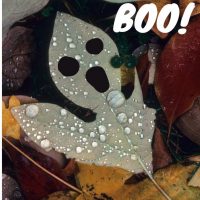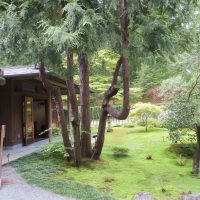February 2022 Plant Profile: Fine Foliage of Large-Leaf Rhododendrons

The species of Rhododendron in the subsection Grandia are all native to southeast Asia, though they blend into our PNW conifer and mixed forests magically. Now is an excellent time to come visit these amazing plants in the Washington Park Arboretum before the distraction of so much color enters the world.
Read moreQueer Botany: The Sapphic Violet

Plants enrich our lives in many ways and each one tells a story. The red rose is known to be the symbol of romance. The 4-leaf clover for good luck.
For the violet, its story and importance to the queer community can be traced back to Ancient Greece and the poetess, Sappho (c. 600 BCE).
Read moreDecember 2021 Plant Profile: Western White Pine and White Pine Blister Rust

Western white pines (Pinus monticola) are five-needled pines that are native from southern British Columbia to southern California. In the northern parts of their range, including in western Washington, they can be found from sea level up to about 5,000 feet in elevation. As their range extends southward they are found at higher elevations. Western white pines are often found in sites with low-nutrient, gravelly soils, where they compete successfully with other native conifers such as Douglas-firs.
Read moreOctober 2021 Plant Profile: Sassafras albidum

Happy October! As Halloween and spooky season approaches, the best way to celebrate is to visit the Washington Park Arboretum and check out our sassafras. These trees are quite festive as they display leaves shaped like little ghosts (or mittens depending on your viewing angle)! Leaves can have a different number of lobes ranging from 1-3 on the same plant.
This deciduous tree displays vivid colors of fall foliage in yellow, orange, red, and pink.
August 2021 Plant Profile: Thujopsis dolabrata

During these dog days of summer I am especially appreciative of all my conifer friends, providing blessed shade, a sweet smell on the air and a cool background on which my squinting eyes may rest. One conifer in particular is especially welcome to my eye, Thujopsis dolabrata var. dolabrata, with its deep green, glossy scales and wide-sweeping branchlets. This gorgeous conifer is stately, trouble free, and slow growing to the point where it will happily spend 30 to 50 years in a Seattle-sized yard without terrifying your too-common panicky neighbor.
Read moreMay 2021 Plant Profile: Ficus carica ‘Desert King’

If you have ever plucked a ripe fig straight from the tree, the sap oozing from the jam-like interior and suspended at the bottom of the fruit, you know that you have to grow your own figs to fully appreciate their wonder.
Read moreApril 2021 Plant Profile: Metasequoia glyptostroboides, aka Hobbit trees

The mysterious case of X-478*A and B, a.k.a. “Hobbit trees”, continue to baffle and impress those who are familiar with these two unique Arboretum Dawn Redwoods.
Read moreMarch 2021 Plant Profile: The Gaultherias of Pacific Connections

The Pacific Connections Gardens is a great place to admire examples of related plants from different parts of the globe. One excellent example of this is the genus Gaultheria. Only a few steps separate Gaultheria species hailing from Chile, China, and the Pacific Northwest!
The genus Gaultheria includes over one hundred and fifty species hailing from North and South America, Eastern and Southeastern Asia, New Guinea, Australia, and New Zealand.
January 2021 Plant Profile: Symphoricarpos albus

As we anticipate La Niña bringing us a snowy winter, let’s take a moment to appreciate a snowy plant, or rather a plant named for its snowy berries – common snowberry. Botanically known as Symphoricarpos albus, the plant is aptly named for its white clusters of fruit. The genus is a combination of “symphori” referring to the Greek verb “to bear together,” and “carpos” from the Greek word for “fruit.” The specific epithet “albus” is the Latin word for “white.” This species of snowberry boasts ripe, white berries that develop in late summer and persist all winter, through the rain, cold temperatures, and even through, you guessed it, our [occasional] snow.
Read moreOctober 2020 Plant Profile: Blechnum penna-marina

Despite not having showy flowers this demure evergreen fern deserves to be grown in more Northwest gardens.
Read more